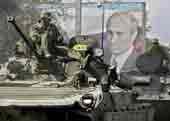The threat is real, but a response unnecessary
By Messenger staff
Wednesday, September 24

The self declared President of secessionist Abkhazia, Sergey Baghapsh, has stated that in the near future a wall will be constructed along the administrative border between Abkhazia and Georgia. “We will launch construction works to strengthen the border between Abkhazia and Georgia. This material border will resolve a lot of problems,” he said. Baghapsh also confirmed that two Russian military bases will be built on the territory of Abkhazia, at Gudauta and Ochamchire. A military airport in Gudauta and the Ochamchire sea port will also be reconstructed.
The Ministry of Foreign Affairs of Georgia has no exact information regarding these construction works, Nino Kalandadze, the Deputy Foreign Minister of Georgia, stressed. She said however that it would not be surprising if the information was confirmed. “In recent days the separatist Republics have carried out totally illegal actions, contrary to both Georgian and International law,” Kalandadze stated.
A military incident between Russian and Abkhaz forces has occurred in the village of Chuburkhinji in the Gali region. Reportedly, Abkhaz separatists entered the house of one of the locals and demanded food and wine. As they got drunk, they started to shoot in the air. Russian soldiers appeared at the house on hearing the shooting, which irritated the Abkhaz separatists. A confrontation followed in which shots were fired, resulting in the deaths of two Russian military personnel and three Abkhaz. A hour earlier, a jeep type had exploded in Chuburkhini, killing three people, among them Besik Kirtadze, the head of the Gali Commissariat, and his secretary.
In the midst of these events the Financial Times has conducted a survey, asking readers whether Russia represents a security threat for Europeans. This shows that following the Russian incursion into Georgia many Western Europeans regard Russia as a greater threat to global stability than states such as Iran, Iraq and North Korea. The survey however reveals a sharp contrast between Europeans’ rising fears of Russia and their unwillingness to support any action to counter it. Although Britain, France, Germany, Italy and Spain are all legally obliged to defend their fellow NATO members Estonia, Latvia and Lithuania under the Atlantic alliance’s Article 5 commitment to mutual defence, most respondents in Germany, Italy and Spain would oppose their troops rushing to defend the Baltic States if they were attacked. In Germany the ratio is 50% against and only 26% for. Only in Britain and France did a majority of respondents support the idea of their armies defending the Baltic States if necessary, despite the provisions of Article 5 and the threat Europeans agree Russia poses.
The survey also shows that a clear majority of people in Western Europe remain firmly opposed to their Governments spending more on defence and thereby diverting resources away from public health and social programmes. The difficulty for Governments contemplating an increase in defence spending is that growing public anxiety about Russia is doing little to change this position, possibly postponing action until it is too late.
